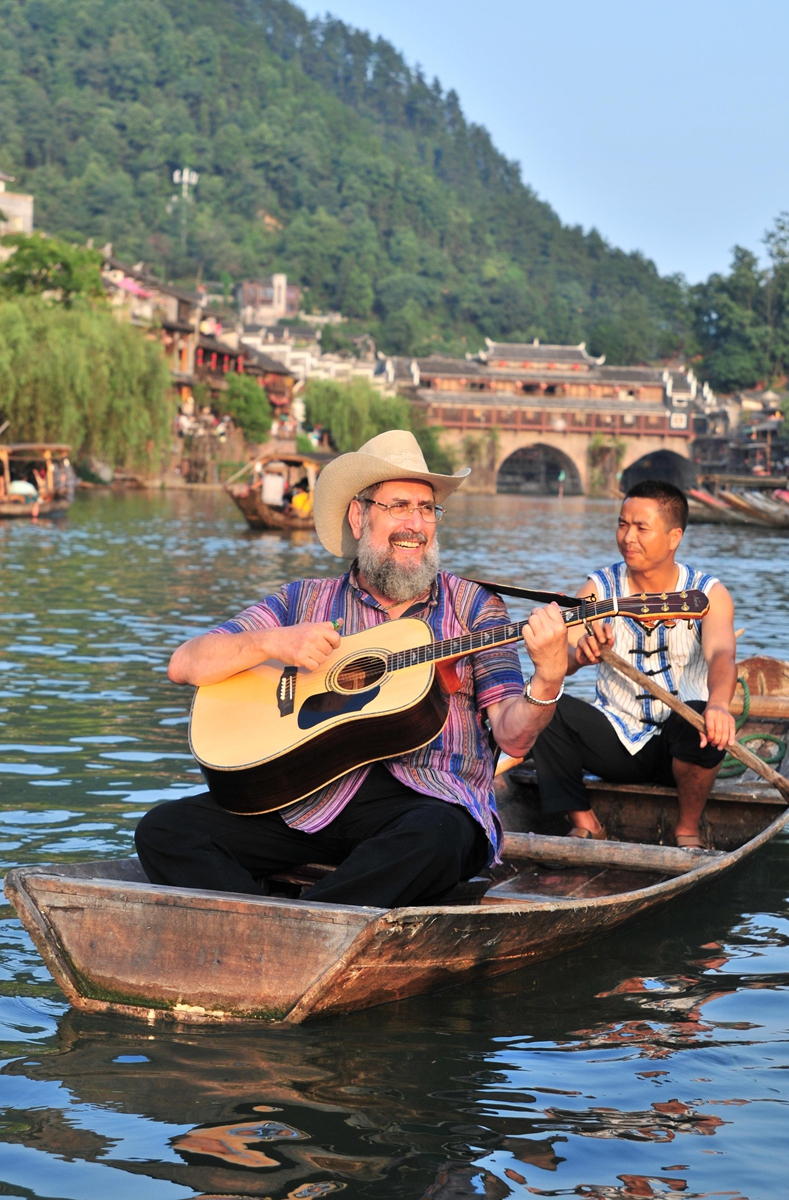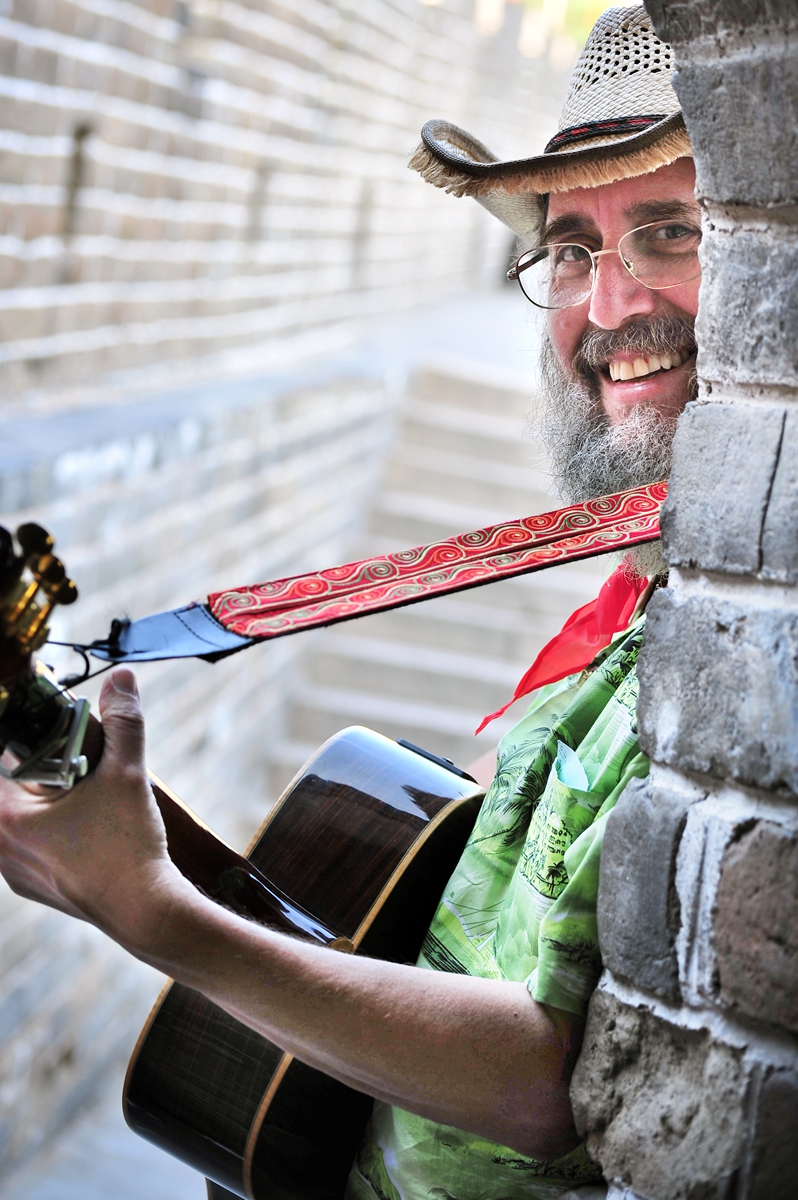IN-DEPTH / IN-DEPTH
American musician turns to China for answer for low-income group’s welfare
Editor's Note:
China's modernization has been an epic journey over the past decades. Under the leadership of the Communist Party of China (CPC), China has become an attractive destination for many foreigners. Many such expats in the country have fulfilled their career aspirations, while some have found love and started families in China.
Why do they choose to live in China? How do expats in China view and interpret China's achievements and persistence measured from various perspectives? The Global Times interviewed multiple international residents in China from all walks of life, some of whom have made tangible contributions to China's development, to learn about their understanding of the essence of Chinese culture, and gain an insight into how far China has advanced in its pursuit of development and rejuvenation over the last decade.

American musician Mark Levine plays the guitar while traveling along the Tuojiang River in Central China's Hunan Province. Photo: Courtesy of Levine
Wearing a red cap with his name embroidered on it and carrying a custom-made guitar, US-born Mark Levine positions himself in front of the camera in a floral T-shirt on a sunny day.
"Many may ask if I'm wearing a Hawaiin shirt but I actually bought it when traveling in Sanya," he jokes while speaking to the Global Times.
The 74-year-old has an abundant life experience. He is a musician who writes about his observations of China; he is a sociologist with PhD; he has witnessed China's fast development while observing the society as an outsider who has praised the country's poverty alleviation efforts.
Around 45 years ago, Levine joined an organization working with the unemployed and low-wage workers in the US.
"We worked with people who are either unemployed or doing various kinds of low-paid jobs, and taught people how to organize together to solve their problems on their own, instead of waiting for the help of government," Levine told the Global Times.
"What we dealt with was a lot of people who had immediate needs: Those with no food; no proper clothing; and those who couldn't afford shoes for their kids nor medical care, dental care, and the ability to get eyeglasses," he recalled.
Levine stayed there full-time for 29 years, all the while offering help and getting to know 20th century's China through his friends and books.
The most famous of these books was published in 1937, Edgar Snow, an American journalist who became the first Western reporter to interview Chairman Mao Zedong and Premier Zhou Enlai. Snow wrote about his interviews and experiences regarding the CPC and published the book which gave the world a glimpse into China.
His book also changed this labor-related volunteer's trajectory for those who would later decide to come to China.
"This was an introductory book for me to understand the history of the CPC and how they started from the countryside, which sparked my curiosity and admiration as well," said Levine, who later published his two books on China after travelling to 29 provinces and regions across the country.
With his friends' help, he came to China in 2005 and was invited to teach at a college in Huai'an, East China's Jiangsu Province, hometown of Zhou Enlai, where Levine spent a lot of time in the Zhou memorial halls in his spare time.
Before his departure to Beijing in 2007, he wrote a song for the place he lived for two years: Huai'an - Promise of the Future.
"I saw the city advancing and I believe it would continue to be a better place."
Experiencing the changes
By the end of 2020, China's strategy of targeted poverty alleviation had culminated in total poverty alleviation. To ensure those in impoverished areas could be a part of a moderately prosperous society, the government sent over 3 million Party secretaries and working team members to carry out targeted poverty alleviation work beginning in 2013.
"This entire process was an extraordinary one. It's not one that I see from my government," Levine talked about the strategy in his view.
Having had experienced working with low-income people, Levine draws clear parallels with the poverty alleviation work done in China.
Yet unlike how he would aid those in need through the non-governmental organization in the US, China's government-led one-to-one form of assistance deeply impressed him on his visits to the most impoverished villages in 2017 and 2018, at the time when he heard from locals that Party members had been living among them, helping farming families gain access to basic necessities such as housing, education, infrastructure, and safe drinking water.

American musician Mark Levine on the Great Wall. Photo: Courtesy of Levine
A multi-ethnic society
Living across a narrow street from Minzu University of China (MUC) where he teaches, although he has travelled in 29 provinces, Levine has spent most of his days over the last 15 years around the area where he's surrounded by students and friends from many different ethnic groups.
MUC students and alumni come from various ethnic groups in China, a fact that hasn't escaped Levine's attention, truly helping him understand the meaning of multiculturalism. Levine has even been a part of ethnic festivities, having participated in the school's Yi ethnic group's festival celebrations in his first year teaching at MUC as well as many others.
One of the most frequent questions he's encountered over his stay in China is what his feelings are about working with people from different ethnic groups. The explanation he would offer would always be simple: "I have to tell you I have never seen nor heard of a single incidence of conflict between students or students and teachers inside the campus. Everyone on my campus work together with an understanding that all of their lives will improve as China develops."
In addition to work, most important part in Levine's life will be music, and he would bring his guitar along while travelling and would perform in rural areas with Fu Han, his er-hu playing musical partner. From the countryside in Central China's Hubei Province to every corner in Beijing, Levine's travels have inspired over 80 of his American country music-style pieces about China.
"I also want more people who have never been to China to break with their prejudice. When I hear someone's prejudice from something they heard from news, I patiently explain the situation. They should listen to China's voice, not blindly spout prejudiced views," he reiterated.
As a "Great Wall Friendship Award" winner, he clearly knows something about the parks to which he pays regular visits west of the city. Inside the park's dense bush he found a hidden site used by kongzhu players, known as the Chinese yo-yo made of bamboo.
"This is the place I paid many visits to before COVID-19," he told the Global Times while walking and taking out his kongzhu but decided to give up on displaying his skill after several failed attempts.
"It's a bit rusty since I haven't been here for a long time," he said, smiling.

